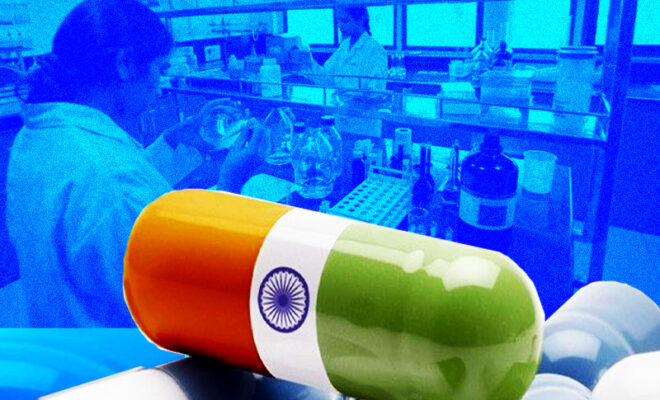India’s Stride Towards Self-Reliance in Pharmaceutical Production

Last updated on August 7th, 2023 at 01:56 pm
Mansukh Mandaviya, the union minister for health, recently reported on India’s outstanding achievement toward achieving pharmaceutical self-sufficiency through the execution of the production-linked incentive (PLI) initiative. This critical move was made in response to the border dispute between China and India in Doklam in 2017, which made India reevaluate its reliance on a single supplier for 95% of the active pharmaceutical ingredients (APIs) used in the formulation sector.
Promoting Domestic Production of APIs
India sought to lessen its dependency on imported 54 APIs through the PLI initiative and to place more emphasis on encouraging domestic pharmaceutical development. The nation has successfully started producing 38 APIs in 18 months, demonstrating a shining example of Atmanirbhar Bharat, India’s self-reliance policy.
The Indian government provided a sizeable budget of 15,000 crore under the PLI scheme to promote self-reliance in the pharmaceutical industry. This monetary assistance significantly increased domestic output, decreased reliance on imports, and improved India’s pharmaceutical capabilities.
Enhancing Healthcare Accessibility and Affordability
Mandaviya stressed that improving healthcare access and affordability is the government’s primary goal, particularly in rural areas. The considerable expansion of medical education, with the number of MBBS seats expanding from 52,000 to 1,07,000 over the past nine years, was one crucial step in this direction. The government’s approval of 54 new medical colleges indicates its commitment to addressing the nation’s shortage of medical experts.
The onset of the COVID-19 epidemic prompted an extensive review of India’s healthcare policies. It encouraged a novel approach to healthcare planning, rebuilding, and innovation by highlighting the value of independence and domestic manufacturing capacity.
Mandaviya emphasised the importance of recognising the ambitions of India’s youth and providing opportunities for their fulfillment while highlighting the country’s rich intellectual and human resources. India can further boost its healthcare industry and establish itself as a pioneer in pharmaceutical development by utilising these resources.
ALSO READ: Amrit Bharat Station: 91 Railway Stations To Redevelop In NorthEast
The Centre of Management of Health Services (CMHS) and IIMA Healthcare Alumni Special Interest Group (SIG) collaborated to conduct the Healthcare Summit, which featured two tracks devoted to essential facets of healthcare innovation. The summit promoted creativity and cooperation in the healthcare sector through panel discussions and contests for start-ups.
India’s progress toward pharmaceutical production independence is evidence of its dedication to Atmanirbhar Bharat. India has significantly improved its pharmaceutical capabilities by lowering import reliance and encouraging domestic production. India’s healthcare industry is positioned for ongoing growth and development with an emphasis on accessibility and innovation.



